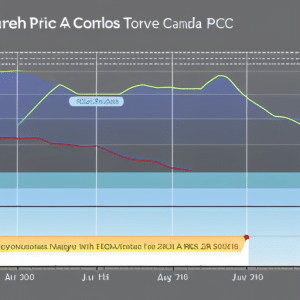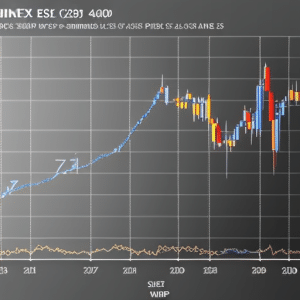Ethereum is a decentralized blockchain-based platform that enables the creation, deployment and use of smart contracts. It has become one of the most popular cryptocurrencies in recent years due to its potential for financial gains. This article will discuss Ethereum’s current price in USD, its performance compared to other cryptocurrencies, and predictions for 2021. Additionally, this article will provide readers with an overview of the risks associated with investing in Ethereum as well as tax implications for investors. Finally, alternatives to investing in Ethereum will be discussed.
Overview of Ethereum
Ethereum is a decentralized open-source blockchain-based distributed computing platform and operating system featuring smart contract functionality. It enables users to build and deploy applications that leverage blockchain technology for secure transparent exchange of data, value, and trustless execution of code. Ethereum has become the basis for countless projects of varying types from currency to logistics tracking systems and many more. It’s novel consensus mechanism allows it to process transactions faster than traditional blockchains while maintaining security and decentralization. Smart Contracts are programmable scripts that execute when certain conditions are met, allowing for automated transactions between two or more parties without any third party intermediaries. This makes them ideal for developing trustless applications such as escrow services, property ownership records, wills & trusts, crowd funding platforms, voting systems and much more. By providing a platform on which developers can create their own blockchain applications Ethereum has revolutionized the way people interact with each other in countless ways.
Ethereum’s current price in USD is subject to market volatility due to its large trading volume across various exchanges around the world. The ETH/USD pair follows daily trends based on news announcements by major players such as governments or businesses entering into the cryptocurrency space. As of today (20th April 2021), Ethereum is trading at $2198 per unit with a 24 hour trading volume of $45 billion USD according to CoinMarketCap data. The strong bullish trend may be attributed to institutional investors’ interest in Ethereum due to its unique features that have made it one of the most popular cryptocurrencies amongst traders worldwide.
Ethereum’s Current Price in USD
At present, the cryptocurrency Ethereum is valued in United States Dollars at a certain rate. The current price of Ethereum (as of June 2020) is around $224 USD and has been fluctuating between $200-$250 for the past few months. Factors influencing the price of Ethereum include buying strategies, regulatory impact, news events, market sentiment, technology advancements and competition from other cryptocurrencies.
In order to profit from investing in Ethereum, investors must have a keen understanding of the factors that can influence its price as well as devise appropriate buying strategies and be aware of any regulatory impacts on their investments. It is important to note that Ethereum’s performance compared to other cryptocurrencies should also be taken into consideration when making investment decisions.
Ethereum’s Performance Compared to Other Cryptocurrencies
Ethereum is one of the leading cryptocurrencies in the world, but many investors are curious how it compares to other major crypto players. Bitcoin, Litecoin, Ripple and Bitcoin Cash are all popular digital tokens that have unique features and advantages. Comparing Ethereum’s performance against these other cryptocurrencies can be very informative for those looking to invest in a digital asset. Investigating factors such as price movements, volatility levels and market capitalization can provide insight into the relative strengths and weaknesses of each currency.
Bitcoin
The astronomical success of Bitcoin in recent years has been nothing short of remarkable. Cryptocurrency mining is the process by which new bitcoins are released and transactions are verified and added to the public ledger, known as the blockchain. The Ethereum platform has enabled blockchain technology to be used for a variety of purposes, such as creating smart contracts that can execute transactions when certain conditions have been met. Bitcoin’s popularity is due to its trust among users and its ability to facilitate secure payments since it operates under decentralized control. Its market capitalization continues to rise despite volatile price fluctuations, making it one of the most successful digital currencies in existence today.
Bitcoin’s main advantage over other cryptocurrencies is its wide acceptance worldwide which allows users to purchase goods and services online without any intermediaries or third-party agents involved. This ease of use, combined with its security features, makes it an attractive proposition for those who wish to use digital currency quickly and securely without having to worry about their data being compromised by malicious actors. As such, Bitcoin remains a popular choice among those looking for a reliable form of digital payment system. Despite this success, however, there are still several areas where Bitcoin could improve upon in order to stay ahead of the competition; litecoin is one such cryptocurrency that offers some unique advantages over Bitcoin which may prove useful for certain applications.
Litecoin
Litecoin is an open-source digital currency which offers a number of advantages over its predecessor, Bitcoin. It was created in October 2011 as a fork of the Bitcoin Core client and can be mined using hardware resources. Litecoin’s main advantages are faster block generation times, improved storage efficiency, and support for more transactions. This makes it suitable for everyday use due to its quicker transaction confirmation speeds when compared to Bitcoin. Litecoin mining utilizes specialized computer hardware that includes CPUs and GPUs, whereas Bitcoin mining requires ASICs (Application Specific Integrated Circuits). Additionally, Litecoin wallets are simpler to install as compared to Bitcoin wallets due to their smaller blockchain size. This means users can set up an account with relative ease while also providing them higher levels of security against malicious attacks. Overall, Litecoin has become a viable alternative cryptocurrency thanks to its increased speed and efficiency when compared to its predecessor.
The next topic focuses on Ripple; a cryptocurrency focused on providing banking services for both individuals and businesses alike through the utilization of blockchain technology.
Ripple
Following the discussion of Litecoin, another popular altcoin is Ripple. Ripple is a cryptocurrency which uses the XRP ledger for sending and receiving payments. It has become increasingly popular due to its low transaction fees and fast processing times. The following bullet list highlights some key aspects of Ripple:
- Ripple Mining: Mining XRP tokens requires specialized hardware and software components, making it more challenging than mining coins based on the SHA-256 algorithm like Bitcoin or Litecoin.
- Ripple Adoption: Despite its challenging mining process, XRP has been adopted by many banks and financial institutions as an alternative to traditional payment methods.
- Low Fees: Compared to other currencies such as Bitcoin, Ripple transactions have extremely low fees which make them attractive for large scale transfers.
- High Speed: Transactions are processed almost immediately, making it possible to send funds anywhere in the world without waiting for confirmations like with other cryptocurrencies.
Overall, Ripple offers users a secure way to transfer funds quickly with minimal costs involved. Its popularity among banks and financial institutions indicates that it may be one of the leading cryptocurrencies in years to come. As we move on from discussing Ripple, we can now take a look at Bitcoin Cash – another major player in the cryptocurrency market.
Bitcoin Cash
Bitcoin Cash is an altcoin that has become popular due to its quick transactions and low fees. It can handle up to 60 transactions per second, making it one of the fastest cryptocurrencies available. The Bitcoin Cash network also offers greater scalability than Bitcoin (BTC), allowing more people to use it without having a detrimental effect on transaction times. Furthermore, miners are able to earn higher rewards for processing blocks in BCH than they do with BTC, which makes it attractive for those looking to invest in cryptocurrencies. In terms of future prospects, many investors believe that Bitcoin Cash could be a viable alternative to BTC as an investment option due to its lower transaction fees and faster transaction times. However, some analysts are skeptical about investing in BCH given the recent controversy surrounding its hard fork event and the potential volatility of prices in the future. As such, investors should consider their own risk tolerance when deciding whether or not to invest in this cryptocurrency.
Ethereum’s Price Predictions for 2021
Analyzing Ethereum’s current performance and historical trends, experts predict the currency to experience significant growth in 2021. Smart contracts, decentralized finance, and blockchain technology have been driving forces of Ethereum’s success. As an open source platform for developers to build applications on top of, Ethereum has seen a rise in use cases that create value for users.
The potential for cryptocurrency as a medium of exchange is growing as more businesses adopt it into their operations. This means that demand for Ethereum could increase significantly if its usage continues to expand in the coming year. With its increasing popularity, experts are predicting substantial price gains in 2021 which could make investing in Ethereum an attractive option for those seeking to capitalize on the digital currency market.
Ethereum’s Use Cases
The value of Ethereum has been a subject of much debate in the cryptocurrency space in 2021, with many speculating on potential price predictions. However, to understand the true worth of Ethereum, it is important to focus on its use cases. Ethereum is best known for being the platform that supports decentralized applications (dApps) and smart contracts. As such, developers are able to create dApps and execute smart contracts using the Ethereum blockchain technology, which makes it an attractive proposition for businesses looking for a secure way to record transactions and store data. Furthermore, because it is open-source software, anyone can develop applications on top of the Ethereum network without having to worry about incurring high costs or encountering other obstacles. This allows companies and individuals to deploy their own solutions quickly and efficiently without needing significant technical skill or resources.
Ethereum’s use cases have continued to expand over time as more businesses become aware of its potential benefits and developers continue working on innovative projects using its blockchain technology. This has also enabled new business models that were not possible before due to the lack of trust between parties involved in transactions. With increasing numbers of companies utilizing dApp development and smart contracts built on Ethereum’s blockchain infrastructure, we are likely to see further growth in adoption throughout 2021 – transitioning us into a discussion about Ethereum’s adoption rate going forward.
Ethereum’s Adoption
Ethereum has seen significant growth in 2020, with its price and usage increasing drastically compared to previous years. This growth is due to an increased awareness of the advantages of blockchain technology, combined with Ethereum’s strong ecosystem. Ethereum’s versatile platform allows for a variety of use cases, ranging from finance to gaming, making it one of the most sought after platforms by both enterprise and individual developers alike.
Ethereum’s growth in 2020
In 2020, Ethereum has seen an impressive growth of over 200%, reaching a peak price of $1,000 USD. This is largely attributed to the increase in adoption and usage of decentralized exchanges, as well as smart contracts which are built on the Ethereum blockchain. These new technologies have enabled developers to build complex applications that can run across multiple platforms without needing third-party servers or intermediaries. The demand for these applications has been steadily rising since their introduction, driving up the price of ETH accordingly. As more users join the network and utilize its advantages, it is likely that Ethereum will continue to rise in value over time.
The potential for growth in 2020 is not limited to just financial gains – Ethereum’s ecosystem has also grown significantly this year. The number of projects built on top of the platform continues to climb at a rapid rate, with more developers taking advantage of its decentralized features every day. This surge in activity has resulted in increased awareness about what Ethereum can offer and ultimately leads to further adoption and usage across multiple industries around the world. With all these indicators pointing towards continued success in 2020, it appears that Ethereum’s current growth trajectory could be sustained into 2021 and beyond. Moving forward into 2021, it will be interesting to see how much further Ethereum can grow within its ever expanding ecosystem.
Ethereum’s ecosystem
Ethereum has seen a dramatic increase in usage and popularity throughout 2020, largely due to its growing ecosystem of decentralized applications (dapps) and smart contracts. Many have been able to leverage Ethereum’s platform to create innovative services and products that would not be possible on other blockchains. This ecosystem is rapidly becoming the foundation for many new business models that are taking advantage of Ethereum’s open source technology.
Smart contracts are pieces of code that can be deployed on Ethereum to automate certain tasks or facilitate agreements between multiple parties. These contracts can greatly simplify complex processes by automating them, ensuring trustworthiness without involving any third party intermediaries. Decentralized applications (dapps) are also built using Ethereum’s blockchain technology, allowing developers to create powerful dapps that run autonomously with no centralized control. The combination of these two technologies has allowed for the creation of an expansive array of new ideas and business models within the Ethereum network. As more businesses move towards utilizing the power of blockchain technology, it is likely that this trend will continue into 2021 and beyond as people take advantage of the scalability and security offered by Ethereum’s ecosystem. Moving forward, we will explore how Ethereum’s future is shaping up in terms of its potential use cases.
Ethereum’s Future
Considering its current performance, Ethereum’s future appears to be incredibly promising. Its decentralised finance and smart contracts have enabled it to become a powerhouse of financial technology, transforming how transactions are conducted and creating an innovative platform for digital currency. Ethereum has the potential to revolutionize the way business is done online by providing transparency and immutability that are not possible with traditional systems. Furthermore, Ethereum allows developers to create applications on its blockchain network, which can further add value to its ecosystem. This is evidenced by the numerous projects that have been built on top of Ethereum such as Augur, MakerDAO and Compound Finance. These applications demonstrate that Ethereum can provide many solutions in a variety of industries beyond just financial services.
The increasing adoption of decentralized finance platforms powered by ethereum has also generated significant interest in investing in ethereum-based digital assets. With more people seeking exposure to this asset class, there is potential for increased liquidity which could further drive growth for the cryptocurrency market as a whole. Additionally, the growing demand for decentralized finance services could lead to higher prices for Ether over time as more people opt into using these platforms instead of traditional banking institutions. All in all, given these factors combined with its innovative features and robust infrastructure, it is likely that Ether will continue to experience significant growth in the coming years ahead making it an attractive investment opportunity for those looking to diversify their portfolios or gain exposure into this asset class.
Investing in Ethereum
The potential for significant returns on investment in Ethereum digital assets has been increasingly attractive to investors. In order to capitalize on the opportunity, investors must understand the differences between two primary methods of obtaining Ethereum: mining and staking.
- Mining is the process of verifying transactions on the Ethereum blockchain by expending computing power. Miners are rewarded with ETH for their work, however this method requires specialized hardware and substantial electricity costs.
- Staking involves a commitment of existing ETH to validate blocks and earn rewards through interest payments similar to a savings account – no specialized hardware or expensive energy consumption required.
- Additionally, staking can be automated with services such as CoinLion Pro that provide real-time insights into market conditions which allow traders to time their purchases and sales more effectively than manual entry alone. By understanding both methods of acquiring Ethereum, investors can make informed decisions about whether mining or staking is most suitable for their goals. Investing in either option has the potential for great returns but carries its own unique risks depending on an individual’s approach.
Ethereum Mining
Cryptocurrency miners have the potential to reap significant rewards by dedicating their computing power to verifying Ethereum transactions. Mining Ethereum is an opportunity for miners to earn Ether, the currency of the Ethereum network. However, mining difficulty has increased exponentially over recent years as more and more participants join the network. This increase in network difficulty means that it requires a higher-level of computing power to mine Ether successfully. As such, miners must invest in powerful computers to remain competitive and profitable within the Ethereum mining space. Furthermore, miners should understand how changes in network difficulty affect their profitability when considering whether or not to participate in mining activities. By understanding these factors before investing in expensive hardware, miners can ensure they are making informed decisions about participating in Ethereum mining activities.
The process of earning rewards from staking Ether is markedly different than traditional mining methods employed by cryptocurrency networks. In order to stake Ether, users must lock up a certain amount of their holdings for a predetermined period of time which then allows them access to various governance rights on the network depending on how much they have staked. The staking process is becoming increasingly popular due to its lower risk profile compared with other forms of cryptocurrency investment such as trading or speculating on price movements as well as its ability for users who are not technically minded enough for traditional crypto-mining activities.
Ethereum Staking
Staking Ethereum offers users a lower-risk investment opportunity than traditional cryptocurrency trading or speculation on price movements. By staking their ETH, investors can earn rewards without having to bear the risk of volatile market prices. Through this process, participants are required to lock up their tokens in a smart contract and validate blocks with the consensus mechanism of proof-of-stake (PoS). Rewards for staking Ethereum come from gas fees collected by miners on all transactions within the blockchain network. As an added incentive to participate in the network, these rewards are paid out as newly minted ETH tokens and dividends from transaction fees.
In return for providing security to the network, validators receive staking rewards that can be significantly higher than any returns offered by traditional financial institutions. Furthermore, these rewards do not require any direct involvement from users as they are automatically sent directly into their wallets once earned. The amount of reward depends on many factors such as stake size and length of time held in the contract; hence it is important for users to understand all associated risks before investing in Ethereum staking.
Ethereum Wallets
An Ethereum wallet is a digital storage space for funds and cryptocurrency tokens on the Ethereum blockchain. There are several types of wallets available, each with their own advantages and disadvantages. These include hardware wallets, mobile wallets, desktop wallets, paper wallets, web-based wallets and custodial services. Each type of wallet provides varying levels of security, convenience, ease of use and cost effectiveness. The right choice depends on an individual’s preferences and requirements.
What is an Ethereum wallet?
Ethereum wallets are digital storage solutions designed to securely store Ether (ETH) and other crypto assets. These wallets provide users with a secure way to access their funds, and protect them from external threats. With regards to wallet security, users should always ensure that they keep their private keys safe, enable two-factor authentication whenever possible, and regularly back up their wallets. Wallet backups can be created using the different wallet providers’ online backup functions or by writing down private keys onto paper. It is important for users to understand the risks associated with storing crypto assets in an online wallet before setting one up.
When considering an Ethereum wallet, it is important for users to understand the types of wallets available and how each one works. This will allow them to make an informed decision about which type of wallet best meets their needs. Knowing this information will also help them take steps towards ensuring maximum security for any funds stored in an Ethereum wallet.
Types of Ethereum wallets
There are various types of Ethereum wallets available, each offering different levels of security and features. The most common type is a software wallet, which can be installed on a computer or mobile device. This wallet allows users to store their private keys in an encrypted format, giving them control over their funds at all times. Other options include hardware wallets such as Ledger and Trezor, which offer even higher levels of security by storing the user’s private key offline. Additionally, decentralized exchanges (DEXs) and DeFi platforms provide unique services that allow users to securely trade cryptocurrencies without having to trust a third-party custodian with their funds.
Another type of Ethereum wallet is an online exchange account, where users can store their crypto assets for trading purposes. These accounts are much less secure than software or hardware wallets because they require trusting a third-party custodian with your funds; however, they tend to be more convenient for traders who want access to the full range of cryptocurrency offerings available on the market. As such, it’s important for users to weigh these risks against the benefits when deciding which type of Ethereum wallet best suits their needs.
Risks of Investing in Ethereum
Investing in Ethereum can be likened to a roller coaster; while potential rewards may be great, the risks should not be ignored. Investors should consider different trading strategies and understand the security vulnerabilities of storing ether tokens in order to mitigate risk and maximize returns. Different strategies involve various levels of risk, from long-term investments to short-term day trading. Security concerns include keeping wallets secure and private keys safe from malicious actors. Additionally, investors must keep up with changes in regulations that may affect their investments as well as account for potential tax implications that may arise. All these factors must be taken into consideration when deciding whether or not investing in Ethereum is the right decision. Ultimately, it’s important for investors to have an understanding of the risks before considering any type of investment in cryptocurrency markets such as Ethereum. By weighing the pros and cons carefully, investors can make informed decisions on how best to manage their exposure to this volatile market.
Tax Implications for Ethereum Investors
Investing in Ethereum carries various risks, including the volatility of its market value. Now, investors should also be aware of potential tax implications when investing in this cryptocurrency. An initial coin offering (ICO) is a form of crowdfunding that uses digital tokens to purchase cryptocurrencies such as Ethereum. The manner in which ICO regulations may impact taxation is often determined by the particular country or region where investors reside. Smart contracts are self-executing and automated agreements between two parties; they are often used for financial transactions and require careful consideration when it comes to taxes. Depending on the jurisdiction, smart contracts can trigger taxable events upon their execution, such as capital gains or losses based on profits made from trading Ethereum or other digital assets. Therefore, understanding the tax laws within an investor’s home country is essential before engaging in any cryptocurrency investments. By taking into account these complex tax implications, investors can make more informed decisions about their involvement with Ethereum and other digital currencies. With this information in mind, investors now have a better understanding of some alternatives to investing in Ethereum.
Alternatives to Investing in Ethereum
Cryptocurrency investors may opt to explore other alternatives to Ethereum as means of diversifying their portfolios. Ethereum futures have recently been launched and offer an avenue for investors who are looking for exposure to Ethereum without having to buy it directly. This could be beneficial for those who want exposure but would prefer not to take on the risks associated with buying cryptocurrency outright. Additionally, decentralized finance (DeFi) is becoming increasingly popular among cryptocurrency investors due to its potential for providing higher yields than traditional investment options. DeFi provides a wide variety of services, including lending, borrowing, and derivatives trading that can provide a more attractive return than simply investing in Ethereum itself. By employing these alternative methods of investing in cryptocurrencies, investors can effectively diversify their portfolio while still gaining exposure to the Ethereum market. With these options available, investors should carefully consider all alternatives before committing funds solely into Ethereum investments. Transitioning now into final thoughts on this topic…
Final Thoughts
Despite the potential benefits of diversifying one’s portfolio by investing in Ethereum and other alternative cryptocurrencies, it is important to remember that such investments involve a certain amount of risk. Therefore, it is crucial for investors to research the fundamentals and security of Ethereum prior to making any decisions. Understanding how Ethereum works as well as its underlying technology can help investors make informed decisions regarding their investments. While there are many advantages associated with investing in Ethereum, doing so without researching its fundamentals and security could potentially lead to significant losses.
It is also important to note that the value of Ethereum may fluctuate over time depending on market conditions. As such, investors should remain mindful of current market trends when deciding whether or not to invest in Ethereum. Additionally, investors may want to consider diversifying their portfolios with other types of investments in order to offset any potential risks associated with investing solely in Ethereum. By taking these steps, investors can ensure they are making wise investment choices that will help them achieve their long-term financial goals.
Frequently Asked Questions
What is the minimum amount required to invest in Ethereum?
Investing in Ethereum requires careful risk management and strategic planning. A successful investment strategy should include understanding the cryptocurrency market, setting realistic goals, and diversifying investments. Knowing the minimum amount needed to invest is important for developing an effective plan.
Are there any hidden fees associated with Ethereum?
When investing in Ethereum, it is important to consider potential security risks and scalability issues associated with the cryptocurrency. These can include hidden fees, which may not be immediately apparent. It is essential to carefully research any potential investment before committing funds.
How can I safely store Ethereum?
Like a precious gem, securely storing Ethereum requires careful planning and consideration of potential security risks. Buying strategies should be considered, such as using online wallets or cold storage solutions to minimize risk. With an understanding of these options and their respective levels of safety, users can effectively protect their investments.
Is Ethereum legal in my country?
The legality of Ethereum in any given country is contingent upon the relevant tax implications and security concerns. A thorough evaluation of the local regulations and policies should be conducted to determine the compliance of Ethereum with those laws. Additionally, any security risks associated with using Ethereum must be carefully assessed before proceeding.
What are the advantages of Ethereum over other cryptocurrencies?
An unstoppable force, Ethereum offers unparalleled advantages over other cryptocurrencies. With its lightning-fast transaction speed and advanced blockchain technology, it has revolutionized the way transactions are carried out. Ethereum’s capabilities far exceed that of traditional digital currencies, allowing for a secure, reliable and efficient system for users worldwide.







